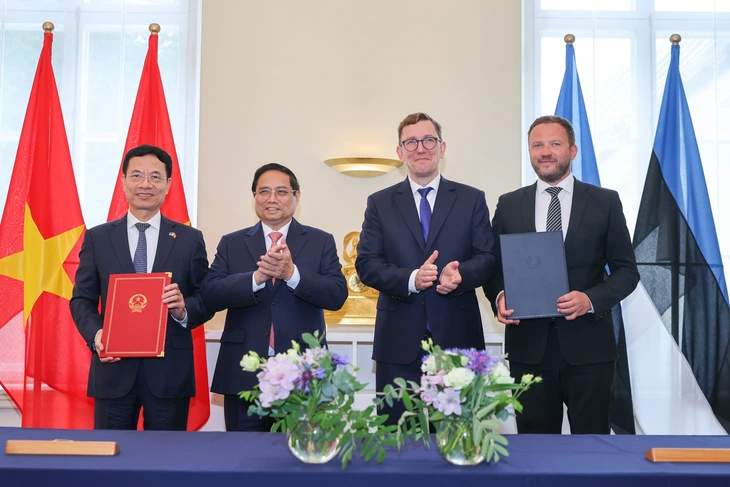
Prime Minister Pham Minh Chinh and Estonian Prime Minister witnessed the handover ceremony of cooperation documents on digital transformation and digital economy between the two ministries of the two countries on June 6 - Photo: VGP
On June 6, Prime Minister Pham Minh Chinh's second day in Estonia began with a visit to the e-Estonia Center, which is considered a symbol of the world's leading successful digital government.
Tax filing is like playing sports
After more than 30 years of independence, Estonia has today become a digital society, with 100% of public services performed online, considered a successful and effective model of digital transformation.
In that journey, the e-Estonia Center was established in 2009, not only as a place to promote national achievements in digital transformation but also as a place to create a platform for public-private cooperation between Estonia and other countries.
According to the Government Electronic Information Portal, at the e-Estonia Center on June 6, Prime Minister Pham Minh Chinh was introduced to the country's achievements in digital transformation.
Petra Holm, digital transformation director at the e-Estonia Center, said the country has a tax declaration that only takes 3 minutes and 3 clicks to complete. Because of this ease, people love to declare taxes, consider it a "national sport" and compete to do it.
After listening, the Prime Minister said that the conditions for digital transformation in a country of 1.3 million people like Estonia will be different from a country of 100 million people like Vietnam. He asked what advice Estonia had for Vietnam to catch up with Estonia in digital transformation.
Responding to him, the representative of the e-Estonia Center said that there is no big difference between applications, tools and utilities for 1.3 million people and 100 million people. The problem lies in whether there is good and secure infrastructure, decentralized data systems and easy, user-friendly applications.
Experience of Denmark, Norway
In a paper published in 2024, the e-Estonia Center began to shape the public’s imagination of a post-digital society. In that vision, Estonia identified that human behavior and habits are constantly changing, but this social change does not come from government imposition.
“Instead, change happens due to individuals' intrinsic motivation to do things differently, because they see personal benefits and are willing to invest in this change,” the e-Estonia Center argues.
In that spirit, the Estonian Government will introduce a new model of public services after digital transformation, with core features of being citizen-centric, accessible anywhere and anytime, strengthening trust and empowering citizens.
Not only Estonia but also other nearby Nordic countries are leading the way in digital transformation such as Denmark and Norway.
Responding to Tuoi Tre, Danish expert Anders Windinge said that Denmark’s digital transformation in public administration began in 2001 and is still ongoing. Although it is not yet complete, Denmark has learned many valuable lessons that can be shared with Vietnam in a similar journey.
According to Mr. Windinge, the legal framework for digital transformation is one of the necessary requirements for the process to be successful. Many laws were written before the digitalization process began, so they need to be revised and updated continuously. However, the main key to promoting the process is the participation of citizens and the Government.
“Citizen happiness is closely linked to the capacity and responsiveness of public administration. Denmark has adopted a decentralized approach to decision-making, because we believe that decisions made closer to citizens lead to higher social satisfaction,” he said.
While it is good to have a spirit of service to the people, Mr Windinge said it is important to take into account factors such as demographics. Not all people have the same level of digital literacy, so to ensure that no one is left behind, programmes are needed to help older people keep up with contemporary trends.
“It is important to make sure that people feel that digitalization efforts are improving their daily lives and that they are not being left behind,” he said.
Also speaking to Tuoi Tre, Norwegian public management expert Halvor Walla said that to ensure a country's successful digital transformation, there needs to be a focus on data collection and performance evaluation.
Norway places great emphasis on collecting comprehensive data and statistics on the performance of the public sector, including local governments down to the grassroots level. This data is used for benchmarking, analysis and continuous improvement. To ensure that this data is reliable, Norway engages a number of independent auditors.
Estonia is ready to cooperate on digital transformation
During his talks with Estonian Prime Minister Kristen Michal, Prime Minister Pham Minh Chinh also mentioned the potential for cooperation between the two countries in digital transformation and witnessed the signing of cooperation in this field as well as digital economy between the two ministries.
He suggested that Estonia strengthen cooperation, exchange information, and share valuable lessons on digital transformation, digital economy, building e-government, developing digital infrastructure, building Vietnam's large data center, and training high-quality human resources.
Agreeing with Prime Minister Pham Minh Chinh's proposals, Prime Minister Kristen Michal affirmed that Estonia wishes to strengthen cooperation in all fields with Vietnam.
In particular, Estonia is ready to stand side by side with Vietnam in the process of digital transformation, innovation and enhancing cooperation in science - technology, artificial intelligence, cyber security, education - training.
Source: https://tuoitre.vn/estonia-bai-hoc-chuyen-doi-so-cho-viet-nam-20250607073448239.htm


























































































Comment (0)